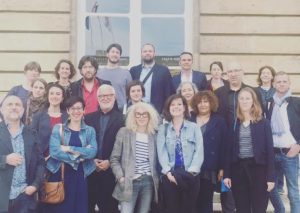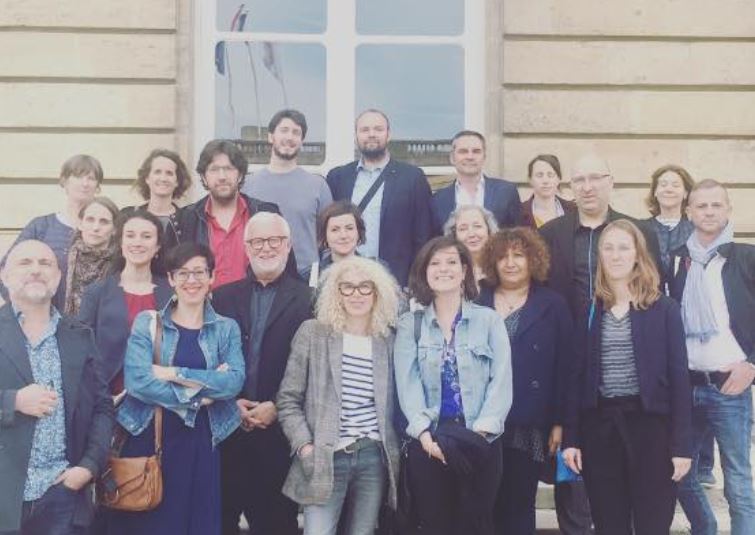 Paris, France, April 2020 – The Nightlife Platform (Plateforme de la Vie Nocturne), in which Efus is a member, recently published a methodological guidebook on the governance of nightlife (Politique publique et Vie nocturne : Gouvernance et Participation / public policy and nightlife: governance and participation)*. Based on the experience of four Efus member cities – Bordeaux (FR), Liège (BE), Nantes and Paris (FR) – this publication aims to help cities to design cross-cutting nightlife policies and to co-produce them with citizens. Interview with Denis Tallédec, Director of the Culture Bar-Bars collective, with which Efus has been working for several years.
Paris, France, April 2020 – The Nightlife Platform (Plateforme de la Vie Nocturne), in which Efus is a member, recently published a methodological guidebook on the governance of nightlife (Politique publique et Vie nocturne : Gouvernance et Participation / public policy and nightlife: governance and participation)*. Based on the experience of four Efus member cities – Bordeaux (FR), Liège (BE), Nantes and Paris (FR) – this publication aims to help cities to design cross-cutting nightlife policies and to co-produce them with citizens. Interview with Denis Tallédec, Director of the Culture Bar-Bars collective, with which Efus has been working for several years.
> The Culture Bar-Bars collective manages the Nightlife Platform since it was established in 2017. What are its objectives?
The Nightlife Platform gathers different types of members: local authorities such as Bordeaux (FR), Liège (BE), Nantes, Paris, Saint-Nazaire and Toulouse (FR) and other stakeholders such as the French Ministry of Culture, local elected official associations, hospitality sector trade bodies, mutual enterprises, resident collectives and structures specialised in risk prevention and intervention in popular areas.
The Platform has a cross-cutting, global approach to nightlife based on the experience of citizen-users, professionals and public authorities. It examines all phenomena linked to nightlife, well beyond the usual conflicts about the use of the city at night, i.e. security and crime prevention, the nightlife economy, as well as the cultural and health aspects of nightlife.
> What are the specific security challenges of nightlife? What are the main challenges faced by cities when designing their nightlife policy?
There are various phenomena in France, in Europe and worldwide that are linked to our societies’ hyper-metropolisation, which creates large concentrations of people in urban spaces. There is in particular a challenge regarding the appropriation of public spaces by young people, who use it to party when in the past, they would do that more often in private spaces.
There are also new behaviours: young people are very nomadic. They meet in a flat, then go to a bar and then, for example, to a gig. This creates conflicts around the use of public spaces. There are also phenomena of poly-consumption (binge drinking in particular).
Furthermore, the nightlife offer is different from one neighbourhood to the other. Actually, in most cities, the nightlife offer is available only in some neighbourhoods, usually in the centre, which raises the question of public transport, equal access, and inequality between the different social classes, in particular in working-class neighbourhoods. How to offer public and private services in these neighbourhoods?
Another question is urban planning: should the nightlife policy focus on so-called ‘destination neighbourhoods’ or encompass the whole city? And in this case, how to ensure security? If the offer is centralised around certain areas only, it generates specific security issues linked to the presence of night owls in relatively small areas and of ‘predators’ who target these places.
We are all becoming more nomadic, in particular with the success of weekend tourism in European cities, which is fuelled by the availability of low cost travelling. However, local residents demand that tourists respect their way of life and customs. The idea is thus, rather than applying a one-size-fits-all policy in all countries and cities, to support each city according to their own local culture and way of life. It is also important to consider tourists as temporary residents of the cities they visit, i.e. with the same rights and duties as resident citizens.
> The Nightlife Platform recently published a methodological guidebook on the governance of nightlife. What are the objectives of this publication, and how was it produced?
We observed that a growing number of cities are establishing Nightlife Councils. They are different from Night Mayors who are either appointed or elected by a nightlife professional category and are recognised in their relationship with public authorities. On the other hand, Nightlife Councils aim at gathering all the citizens, stakeholders and public authorities that are affected one way or another by the nightlife in a given territory. They are the basis of any cross-cutting nightlife policy.
There are a number of Nightlife Councils in France and also elsewhere in Europe, such as in Brussels (BE), Liège (BE) and Rotterdam (NL). Many local authorities contact the Nightlife Platform to exchange experiences. So we had the idea of creating a tool to explain how to establish a Nightlife Council, whatever its form. We used four examples of Nightlife Councils recently established in Bordeaux, Liège, Nantes and Paris, with contributions by security coordinators and elected officials who designed and compared these tools. The idea was to provide cities with different examples, showing their similarities and differences.
> A large part of the guidebook focuses on cooperation between elected officials and associations. What are the advantages of such cooperation?
This kind of cooperation is really what inspired the Platform in the first place, which was set up around the ideas of cross-cutting policies and the creation of a common culture. Agreeing on existing schemes, mapping them out and discussing the challenges they pose in order to imagine and evaluate different types of action: all this is highly political.
> New initiatives on nightlife governance are emerging across Europe. How does the guidebook published by the Nightlife Platform encourage cities to adopt new methodologies?
This guidebook is another contribution to this issue. Its purpose is to feed into local initiatives by fostering the exchange of experiences and describing a number of initiatives. But we are only at the beginning of the process. The question today is whether we can have more consistent public policies at the level of one territory. Furthermore, we want to examine how the various public bodies work together, for example when the national government works with municipalities on crime prevention. The challenge is to make public policies more consistent and to work less “in silo”.
If a policy boils down to having a Nightlife Mayor, the focus will only be on the city’s clubbing offer and on the management of conflicts with local residents. But this does not amount to a proper vision of what nightlife should be in the future for our cities, in a spirit of fairness. Do we want 24/7 cities or other models of nightlife? The Nightlife Platform doesn’t provide answers but rather lays out the challenges in order to draw the attention of elected officials and practitioners on the fact that developing tourism also means addressing issues of health, crime prevention, security, and the management of urban spaces.
> Efus has long been working on nightlife, in particular with the cities of Paris, Bordeaux and Liège, which are featured in the guidebook. How would you evaluate their nightlife policies?
We observe that different types of initiatives emerge in each city, and also that they have all benefited from the exchange of experiences facilitated by the platform. Some practices were transferred and re-invented in other cities, according to their own specificities. But there are also obstacles: the cross-cutting aspect of policies is not easily manageable and requires time. We note that cities are powerful spaces for exchange and co-construction. Both citizens and professionals agree that they are very important spaces and that in the past, there were no places where the global issue of nightlife could be addressed as such.
> Following the publication of this guidebook, what is the Platform working on in order to promote its recommendations?
The guidebook is not set in stone. It gathers experiences and will be updated over time. What we see today is that nightlife is becoming a public policy field in its own rights and that new initiatives are constantly emerging.
> Are you contemplating expanding the Nightlife Platform to other European cities and countries?
Indeed, the Platform was initially a French initiative, but a number of European stakeholders have since joined it. For example, we are setting up a scientific committee gathering academics from different disciplines, such as geographers, sociologists and legal experts, in order to cross-fertilize university research, public authority experiences, and professional practices. This network has real international added value and gathers researchers from all over the world.
* The guide is available in French
> Read the methodological guidebook on the governance of nightlife




